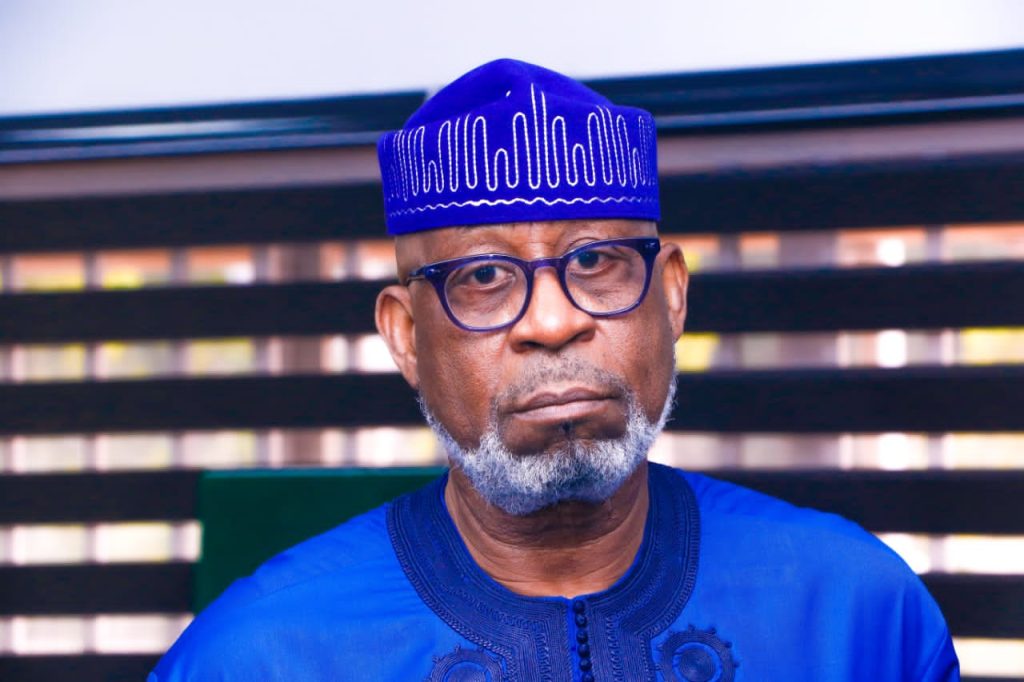Priscilla Ojo graduated from the Department of Biochemistry, Landmark University, with a Cumulative Grade Point Average (CGPA) of 4.98 on a scale of 5.0, making her the best graduating student of the university. In this interview by AYO AKANO, she speaks about her academic journey, her passion for biotechnology, among others.
How would you describe the kind of secondary school education you had and how did it prepare you for university education and life?
My secondary school education at St. Anne’s Secondary School, Kaduna, was an exciting and formative experience. It’s one of the top private schools in Kaduna, and I was fortunate to benefit from a grading system focused on excellence. The system set a high bar, awarding an ‘A’ for grades above 90 percent, which meant that even a score of 89 percent would result in a ‘B’. This structure pushed me to always aim for the best, and I graduated with a cumulative average of 91 percent, as the overall best graduating student in my set.
Transitioning to Landmark University, I carried the same drive for excellence with me. This mindset made my academic journey smooth and helped me achieve excellent grades without much stress. Additionally, I had the privilege of serving as the Head Girl in the 2020 set, a role that sharpened my leadership skills and helped me grow personally and professionally. These experiences, combined with the values I developed in secondary school, laid a strong foundation for my success in university and beyond.
In one of your recent LinkedIn posts, you stated that your original intention was to study medicine at the University of Ibadan (UI), but ended up studying biochemistry at Landmark University. What prevented you from studying medicine at UI?
While I originally aimed to study medicine at the University of Ibadan, meeting the cut-off with a JAMB score of 279, I was advised to start with biochemistry and later switch to medicine. However, the uncertainties surrounding strikes at that time, combined with intense competition from those scoring above 300, made admission less certain. This led me to Landmark University, where I chose to study biochemistry, though I kept the idea of medicine in mind. By my 200 level, I found myself genuinely passionate about biochemistry and realised I was right where I belonged. I became deeply engaged in the field and felt a growing enthusiasm for its potential and my future in it.
Looking back, I have no regrets about not pursuing medicine, as I discovered that biochemistry was exactly the path I was meant to follow.
How would you describe the kind of education you had at the Biochemistry Department and the university?
My biochemistry education at Landmark University was truly exceptional. I was fortunate to learn from the best lecturers who went beyond teaching to serve as life coaches, making them approachable for discussions not only in academics but also in life in general. Their guidance provided an atmosphere of mentorship that enriched my university experience. The learning environment was highly conducive with a supportive community among my classmates. We worked together as a family often organising study sessions and tutorials that strengthened our understanding and fostered strong bonds. I had invaluable project supervisors who offered insights and support to my academic growth.
I couldn’t have asked for a better department than biochemistry — it was undoubtedly the perfect place for me to learn, grow, and prepare for my future.
What aspects or areas of biochemistry interest you more and why?
The area of biochemistry that fascinates me the most is biotechnology, specifically genomics and recombinant DNA technology. I’m particularly interested in how these tools can be used to bioengineer microbes for breaking down substances, which has immense potential in biofuel production. This field excites me because it aligns with my goal of producing eco-friendly biofuels, which can have a positive impact on climate and contribute to several sustainable development goals. The idea of applying biochemistry to addressing global environmental challenges is incredibly fulfilling for me.
What was the title of your final-year project and what were the major findings from it?
The title of my final year project was ‘Effects of heat exposure on specific rat metabolic hormones and liver function indices’. Climate change can alter the composition of the global atmosphere resulting in higher ambient temperature and heat stress as a result of severe high temperatures negatively affects metabolic homeostasis and triggers a severe inflammatory response.
The data from my project showed that heat exposure might have caused oxidative stress and inflammation, which inadvertently affected the metabolic hormones of the rats. The female rats showed increased levels of metabolic hormonal imbalance and were more predisposed to liver damage compared to their male counterparts, indicating that gender might play a role in the biochemical effect of heat exposure.
You graduated with a CGPA of 4.98. How do you feel not graduating with a perfect CGPA of 5? What course(s) prevented you from making a CGPA of 5?
Graduating with a CGPA of 4.98 feels like an incredible blessing, and I attribute it entirely to God’s grace. I focused on working hard and doing my best, and the results naturally followed. I am truly overjoyed with this outcome, as a 4.98 is an excellent result just as a 5.0 would be. Reaching this point exceeded my expectations and I’m grateful for it.
There were two courses where I earned a B — CST 121 in my 100 level and EDS 411 in my final year, which impacted my final CGPA. However, I can see my 4.98 as a reflection of my dedication, and I’m incredibly proud of what God made me accomplish.
You said Bishop David Oyedepo’s quote “Every star has a scar, and the scar of every star is sacrifice” is a mantra for you. How does this quote relate to your feat at Landmark University?
The quote resonates with my journey to becoming the overall best-graduating student. Achieving this required a lot of sacrifice — from sleepless nights to times when I secluded myself to focus solely on my academics. While I did make time to rest, there were moments when I had to push myself to keep going instead of relaxing because I knew what I was working toward.
A major challenge I had to overcome was time management. At first, I struggled to stick to my planned schedule, and activities would spill over, causing stress. Over time, I disciplined myself to stay on track with each task, which made a noticeable difference in my study routine. The journey required focus and sacrifice, but the result was worth it and the experience taught me valuable lessons that go beyond academics.
Were you active in any extracurricular, social or leadership activities as an undergraduate?
I was actively involved in extracurricular activities, serving as the Vice President of the Nigerian Society of Biochemistry Students (NSBS) at Landmark University. The role was an exciting opportunity where I developed leadership skills and learned the value of effective team collaboration.
Additionally, I was privileged to tutor fellow students in biochemistry, chemistry, mathematics, and even physics. Teaching these subjects not only deepened my understanding but also made studying more engaging and fulfilling. There is a unique satisfaction in helping others grasp challenging concepts, and it made me feel like I was contributing positively to their academic success. Overall, these experiences were incredibly rewarding and helped shape my growth.
In what ways do you think you can impact society, especially in terms of health and well-being, with the course you studied?
With a degree in biochemistry, particularly in the field of biotechnology, I see great potential to make a meaningful impact on health and society. My specific interest lies in biotechnology applications like biofuel production, which can address one of society’s pressing challenges-pollution. Biofuels, as eco-friendly alternatives, have the potential to significantly reduce pollution and reliance on fossil fuels, leading to cleaner air and a healthier environment.
Beyond biofuels, biotechnology offers a wide range of applications that can transform health and environmental sustainability. Via recombinant DNA technology and genomics, microorganisms can be bioengineered to break down pollutants, manage waste more efficiently, and even support agricultural practices that are less damaging to the ecosystem. This would solve societal problems, improve public health, and support global efforts toward a more sustainable and resilient future.
Your LinkedIn bio said you are passionate about bridging the gap in science, marketing, and education. How are you currently doing that?
In pursuing digital marketing, I wanted to explore a field beyond my core study of biochemistry, giving me a broader perspective beyond the sciences. My interest was sparked by personal experiences with poor customer service, which showed me the importance of moving customers from initial awareness to loyalty. Understanding this journey through the marketing funnel is crucial yet often overlooked by businesses. As we move further into the digital age, the way people engage with content has shifted, and digital marketing continuously adapts to these new technologies.
I am also preparing for a future where I plan to establish an organisation focused on producing eco-friendly biofuels using biotechnology. To make a positive impact on the climate, we would need large-scale production and effective outreach strategies. Digital marketing will be essential to reach and engage the right audiences, making it a skill that contributes not only to my personal growth but also to my larger goals in sustainable development.
I speak for myself when I say it is not too much for a fresh graduate to undertake. All that is needed is effective time management, planning, dedication and commitment.
In your professional life, who are your three mentors and why? Where do you see yourself in five years?
I don’t have specific individual mentors in the traditional sense. Instead, I see God as my guide and mentor, leading me to connect with people who provide valuable lessons at each stage of my journey. Throughout my academic and personal growth, I’ve drawn inspiration from various people who have contributed uniquely to my perspective and progress.
In the next five years, I see myself fulfilling my purpose and working towards the goal I’ve set, including building a foundation in biotechnology and contributing to sustainable, eco-friendly innovations like biofuels. I aim to make a positive impact on both health and the environment, helping to solve societal challenges while advancing my expertise. My hope is to be well on the path to realising these aspirations and contributing meaningfully to the field.
What is your advice to students aspiring to achieve the kind of academic feat you achieved?
My advice to students aspiring to achieve similar academic success is to approach their studies with discipline, dedication, and a genuine commitment to learning. I often say, “Unless you chose a course by accident, you chose it because you’re drawn to it, and that connection should fuel your passion to give it your best.”
When you’re truly invested in your course, it becomes easier to commit to doing your best. I also encourage students to study without pressure, focusing on understanding the material rather than just aiming for good grades. When you understand, the course becomes part of you, and the results will naturally reflect your dedication. Academic success comes from making consistent efforts to value learning as a journey not just a destination.
Above all, always pray and ask God for His guidance and help. With faith and hard work, you will achieve your goals and make the most of your academic journey.
READ ALSO: LASU: Sanwo-Olu rewards best graduating student with N10m (VIDEO)

 3 hours ago
2
3 hours ago
2













